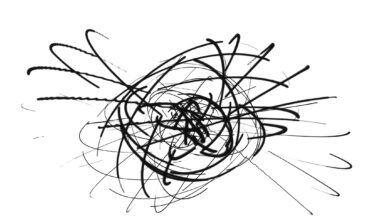Root Manoeuvres

Parisian electronic musician Niamké Désiré never got to meet his grandfather Mensah Antony, a trumpet player and renowned figure of the Ivory Coast music scene in the 1950s. He’s also never been able to track down any recordings that might exist from his grandfather’s musical career. Despite this, on his debut album as Aho Ssan – 2020’s thunderous, twisting ‘Simulacrum’ – Désiré found a way to simulate his heritage by dreaming up The Mensah Imaginary Band. This synthetic ensemble was named in honour of his grandfather and created by the artist using Max software objects and patch cables. Talent clearly runs in the family.
‘Simulacrum’ situated Aho Ssan somewhere in the realm of other hard-edged experimental producers like Tim Hecker, Ben Frost or Slikback. His sonic language is uniquely his own though, and on his debut album, he applied it to questions of equality, identity and lived experience of racism and discrimination while growing up in the French suburbs.
A collaborative LP, ‘Limen’, then followed in 2022 with fellow sound explorer KMRU (the moniker of Kenyan ambient producer Joseph Kamaru). It’s a record that skilfully balances Kamaru’s gentler tones with Ssan’s trademark, all-encompassing blasts of noise.
Now, on his electrifying second solo album ‘Rhizomes’, Ssan again reimagines how collaboration might look and sound, though this time he’s joined not by an imaginary band, but by a real flesh-and-blood crew. And what a cast it is too. With the likes of Nicolás Jaar, Moor Mother, Valentina Magaletti, Blackhaine, Angel Bat Dawid and many others on board, ‘Rhizomes’ presents a who’s who of forward-thinking names in experimental electronic music.
In fact, there’s only one track on ‘Rhizomes’ where Ssan appears solo. ‘Tetsuo II’ is a writhing, complex arrangement of dark IDM electronica, moving like a hyperreal creature driven by a pulse of fractured beats. It’s the kind of sound design that has you scratching your head in amazement, wondering just how he constructs this stuff. Across the album, these immersive and imposing soundscapes are fertile soil from which fascinating musical conversations burst into life.
One particularly arresting dialogue is between Ssan and the Lancashire rapper and musician, Blackhaine. On ‘Cold Summer Part I’, Blackhaine’s vocal intensity is barely contained, rising with increasing agitation over shuddering sub-bass and shattered electronics. The song waxes and wanes like a boxer in the ring, constantly drawing on hidden energy reserves.
Then there’s ‘Till The Sun Down’, featuring American hip hop group, Clipping and Polish cellist/composer Resina. It’s a maze of distortion and unspooling industrial-strength trap, with Resina’s instrument treated and transformed beyond recognition, as the ominous lyrics, “Why you pull the gun out / Run away, run away”, cut through the haze. Ever-so-slightly less severe is ‘Away’, a composition that creeps and contorts, egged-on by French/Moroccan vocalist Exzald S and Italian percussionist Valentina Magaletti. ‘Tetsuo I’, featuring Emptyset’s James Ginzburg, begins in a fit of acoustic-sounding scrapes, before fizzing electronics and plaintive keys take over.
Other People label-founder Nicolás Jaar appears on ‘Le Tremblement’, a brief, somewhat mournful piece that almost sounds like two separate songs spliced together, with an ending that highlights Jaar’s enduring knack for a well-placed sample. ‘Rhizome IV’ enlists jazz luminary Angel Bat Dawid and French electronic composer Mondkopf, and is led by Moor Mother’s inimitable poetics and urgent line of questioning: “Can you see an invisible world / Can you see, can you hear, are you listening / Invisible worlds beyond the shadow.”
Still want more? There’s also a book that accompanies ‘Rhizomes’, featuring illustrations, an extended version of the album, a sample pack designed by Ssan, and additional tracks (all accessible via QR codes). This multimedia element points to Ssan’s background in graphic design and film studies, and his previous work producing soundtracks for French television and film. Accordingly, the first and last pieces, ‘Ouverture’ and ‘Fermeture’, featuring Kenyan vocalist Nyokabi Kariu˜ki, act like opening and end credits, neatly closing the loop on this ambitious, intricate work.
This is music that was never intended to be easy listening. ‘Rhizomes’ is an album that certainly isn’t afraid to pose questions in its quest towards something and somewhere new, and in many ways philosophy is at the heart of Aho Ssan’s work. For ‘Simulacrum’ he took concepts by the cultural theorist Jean Baudrillard as a starting point. ‘Rhizomes’ was inspired partly by the work of French philosophers Gilles Deleuze and Félix Guattari and their idea of “an ever-evolving structural model, constantly in motion and spreading out in all directions at once”.
The titular rhizomes, meanwhile, come from Ssan’s interpretation of the works of French writer Édouard Glissant: “The root thought is the one that kills everything around itself, while the rhizome is the root that stretches out to meet other roots.” The rhizomes here, of course, are the human connections. The energy generated by these diverse co-creative interactions and artistic partnerships lend a warming edge to Ssan’s gritty, multilayered compositions. ‘Rhizomes’ is the sound of the zeitgeist, charting a hopeful path towards possible futures.





